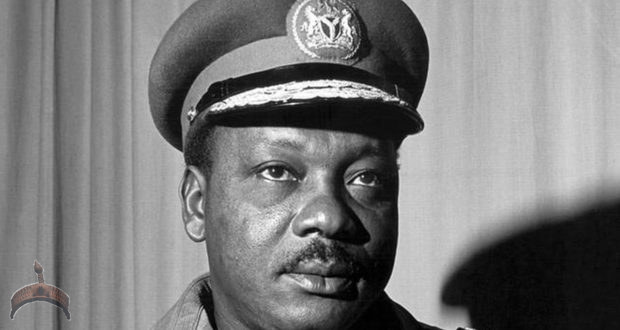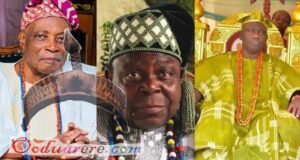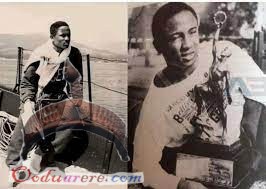The Igbo man is known to enjoy blaming the Hausa – Fulanis, Yorubas and indeed every other Nigerian tribe and Lord Luggard/Britain for their third class citizen status of Nigeria. In their perpetual attempts to a play the victim card, they recount the political events of Nigeria from 1914 to the present in a half-baked and highly selective manner which cleverly avoids the mention of the roles played by their elite who by all natural laws of judgement were actually responsible for the woes that befell not only the Igbo race but the entire Nigeria.
The story told in the post above is one of such selective and distorted accounts of history which the average Igbo man is fond of.
However, the national archives have the complete and unedited history of Nigeria regarding the political events beginning from even before 1914. I will therefore proceed to furnish this house with the complete story for all to read and be endowed with enough facts so as to judge from an informed position.
Shortly after the 1914 Amalgamation of the Northern and Southern Protectorates, it started getting clear that the country was bound to fail as the amalgamation in question was done by colonial fiat without the consent of the different Ethnic group which were over 300. This prompted the political leaders to start asking for de-amalgamation so as to forestall the future danger which the forced amalgamation portended.
To that end, Ahmadu Bello, speaking on behalf of the Northern protectorate in 1944 described the amalgamation as “The mistake of 1914 which if allowed to remain will ultimately lead to unstoppable bloodshed and a failed country”.
Awolowo, speaking on behalf of the Yorubas and Western minorities, described Nigeria as a mere geographical expression not qualified to be a called a country let alone a nation. Awolowo added that if the amalgamation could not be reversed, then Nigeria should be structured as a strictly federal state so as to enable each tribe enjoy autonomy this freedom from being dominated by any other tribe.
But Nnamdi Azikiwe, speaking for the Igbos, denounced Awolowo and Ahmadu Bello, termed them ethnic champions, accused them of nursing a sectional agenda against the unity of Nigeria, and declared that the Unity of Nigeria was non-negotiable.
After moving motion for independece in 1953, Anthony Enahoro proposed that a secession clause should be incorporated into the future Constitution of Nigeria so as to give legal backing for any tribe to peacefully exit the forced union if it feels marginalized in future. According to Enahoro, such provision in our constitution would instill in all Nigeria’s future leaders the fear of the consequences of misgovernance. But Azikiwe, speaking on behalf of Igbos, rose against him in the parliament and labelled him an agent of disunity, and enemy of Nigeria. At a later date, Awolowo too made a case for secession clause, but Azikiwe again resisted him and instigated the colonial authorities to threaten him and Enahoro with charges of treasonable felony if they didn’t stop proposing secession clause for the future Constitution. While Azikiwe did all this, Igbos cheered and urged him on because they felt the future Nigeria was theirs to dominate and lord it over every other tribe.
Before independece, Tafawa Balewa too had in a public speech described Nigeria as a British experiment and Nigeria’s unity as a British intention which Nigerians themselves don’t believe in. But Azikiwe kicked demonized him too. Had Azikiwe co-operated with Enahoro, Awolowo, Ahmadu Bello and Tafawa Balewa about the secession clause, Nigeria perhaps would not have been this misgoverned.
For those in doubt, here is a link of one of the numerous instances in which Nnamdi Azikiwe fought against the secession clause proposal for the future Nigeria constitution.
It should be noted that there were many Igbo members of the parliament in which Azikiwe fought against Awolowo’s secession clause proposal in the link above, but not a single one of them rose against Azikiwe or condemned him.
Igbos initially never wanted to hear anything like secession in Nigeria because they so much believed, though falsely, that they were the most educated tribe. (The first Nigerian tribe to produce a university graduate is the Binis).
As an evidence of Igbo domination agenda hence their initial resistance to the idea of secession; here are some quotes:
“From all indications, the god of us Igbos have destined us to rule the whole of Africa”….. Nnamdi Azikiwe (1945).
“It is getting clearer each day that Igbo domination of Nigeria is just a question of time”… Oscar Onyeamma. (1949)
As at 1900, the whole of the present Benue State, Kogi East Senatorial District and some southern parts of Taraba State called Munchi District back then; were all in the Southern Protectorate. Whoever doubts this should consult MacMillan Atlas for Secondary Schools in Nigeria.
With that situation, the South had a higher population than the North hence always had an upper hand in any democratic bargain.
But as at the early fifties when the regions were being created, common sense dictated clearly that these areas should fall in the future Eastern Region. But against common sense, the colonial masters decided to gerrymander them into the Northern Region. While they did that, the Azikiwe who was supposed to be in Enugu fighting against it as the leader of the East, was far away in Ibadan struggling with Awolowo to rule the Western Region and also playing the spoiler role against Awolowo’s attempts to have Kwara and present Kogi Yorubas carved into the Western Region from the North which was already too large by landmass.
While he abandoned his burning house and was far away in Ibadan struggling against Awolowo for his own (Awolowo’s) region, Igbos saw absolutely nothing wrong with that. Rather, they applauded him as a nationalist. A nationalist whose house was burning yet busy chasing rats in a far away land.
When opinions became unanimous that Lord Luggard and his government must be forced out of Nigeria and indeed the whole of Africa, it was still the Igbos that frustrated the attempts. Here is how:
In 1948, Anthony Enahoro organized an anti-colonization symposium in Lagos for which Azikiwe and some other Igbos had agreed to deliver the keynote address.
But when the D-day came, Azikiwe was nowhere to be found as he deliberately disappeared into thin air for fear of being arrested and dealt with by Lord Luggard.
Anthony Enahoro then quickly replaced Azikiwe with another person who did the job improptu but perfectly well as he lambasted and lampooned Lord Luggard and the British Government. However, the British soldiers invaded the symposium venue, arrested the speaker and Enahoro and jailed them for treasonable felony.
Ironically, the next day Azikiwe came out of hiding and granted a radio interview in which he accused Enahoro and the other organizers of suffering from youthful exhuberance.
On regaining his freedom few weeks later and being told of Azikiwe’s radio interview, Enahoro resigned from his post as Editor of Azikiwe’s newspaper – The West African Pilot.
Then he wrote a book titled “Nnamdi Azikiwe: Sinner of Saint”. After launching the book, Enahoro left Azikiwe’s party – the NCNC, and moved over to Awolowo’s Action Group. The first military coup in Nigeria was carried out by majority Igbo army officers. That was the coup that truncated democracy just six years post Independence and led to a succession of coups which put the country on the reverse gear for 33 years.
Through that first coup, those Igbo army officers who accused the politicians and government of the day of monumental corruption, killed the political leaders of the Northern, Western and Midwestern Regions but allowed all Igbo political figures escape by tipping them off prior to the D-Day. In addition to the killing of political figures, they also killed a total of 27 innocent high ranking military officers from every region except their Eastern Region.
In the end an Igbo man called Aguiyi Ironsi, who was supposed to have been killed alongside other military officers, ended up becoming the new military ruler of Nigeria. Rather than immediately arrest and punish the coup plotters, he kept them in detention where they were treated as heros. This was actually what sowed the seed for the eventual Biafra War. On the 23rd of February 1966 (i.e. a month and 8 days after the first coup porpularly but wrongly known as Nzeogwu coup, an Ijaw born Army officer called Isaac Adaka Boro who hailed from Kaima town of present Bayelsa State, declared the secession of the Niger Delta Republic in an attempt to free his Ijaw people from the monumental marginalization they had been suffering under Igbos in the old Eastern Region.
But Aguiyi Ironsi immediately ordered Colonel Odumegwu Ojukwu to arrest him and hand him over to the military high command under him in Lagos. Ojukwu went all out against Isaac Adaka Boro with federal military might and within 12 fighting days killed 150 Isaac Boro’s soldiers, arrested him, stripped him naked, and had him driven to Lagos and handed to Ironsi who immediately charged him to court and within two months secured against him a conviction of treasonable felony for which he was sentenced to death by hanging fixed for December that year by the Supreme Court. His ‘crime’ was that he declared secession of The Niger Delta Republic from Nigeria. Meanwhile the Igbo coupists who shed innocent blood of other Ethnic group and even sprayed bullets into the bellies of the pregnant wives of Ahmadu Bello and Brigadier Shodeinde were not charged to court or arraigned before any military tribunal.
Isaac Adaka Boro was in detention waiting for December to come for him to join his ancestors. But God so kind, a revenge coup happened on July 29 by Northern soldiers and Ironsi was overthrown and killed. Gowon took over and released Isaac Adaka Boro unconditionally, reinstated him into the Army with his previous rank.
Then on May 30, 1967, Ojukwu too declared secession of Biafra Republic from Nigeria and without consulting or apologising to Isaac Boro’s, drew a Biafra map which included the very areas that made up Isaac Adaka Boro’s earlier declared Niger Delta Republic for which he fought against him and killed his soldiers.
Seeing such level of arrogance in Ojukwu, Isaac Boro asked Gowon to provide arms for him to crush Biafra by fighting on the Nigerian side in vengeance for Ojukwu’s frustration of his own secession declaration 15 months earlier.
Isaac Boro, as an Ijaw man conversant with the waterways, led the Nigeria Army through the coastal areas into Igbo land to finish off thousands of Ojukwu’s soldiers thus leading to the crushing defeat of Biafra.
But today, Igbos accuse Ijaws of betraying them in the war. But from the facts as above, who really betrayed the other in all honesty? Be against Ojukwu’s declaration of Biafra was as follows:
After Ironsi and Ojukwu successfully crushed Isaac Boro’s Niger Delta Republic declaration, Ironsi immediately proceeded to promulgate the Anti-secession Decree which made the mere mention of secession from Nigeria punishable with death by hanging. Ojukwu openly supported and endorsed the decree despite disapproval of it by the general public. So when Ojukwu later declared Biafra secession, he was reminded of the Anti-secession Decree made by him and his brother Ironsi.
Deadly Truth: Igbos frequently reference Aburi Accord to create the impression that the rest Nigerian Races don’t honour agreements. This is a very dishonest narrative from Igbos.
First and foremost Aburi Accord was organized by soldiers and unelected civil servants who should not participate in political exercises like making laws due to the civil service anonymity principle. Secondly, those civil servants and military men in attendance were not elected by their federal constituencies to the Aburi summit. In the philosophy of democracy, the only universally acceptable way of making laws is through duly elected representatives of the people. But in going to Aburi the peoples’ representatives duly elected in the 1965 elections were all sidelined for soldiers to hijacked the process. Where on earth do soldiers make laws for the people? Rather the civilian populace makes laws that guide the military. Aburi Accord therefore had no seal of the people’s sovereignty hence it was an illegality which shouldn’t have been allowed to stand.
Thirdly, in 1957, Nigerians from all federal constituencies democratically elected representatives whom they sponsored to London, paid their flight tickets and hotel accommodation for the Independence Constitutional Conference. Those representatives all resolved and agreed on federalism, marked by regional autonomy and resource control in the Independence constitution which they brought back home and everyone accepted it.
In that constitution, Nigerians all agreed that on no account shall the military take over power. It was also clearly stated in it that ammendments to it could be done by only democratically elected respresentatives.
That constitution was the first ever agreement between all Nigerians.
On the day of his inauguration as the Army GoC, Aguiyi Ironsi stood before the whole world and with his own mouth swore to protect and defend that sovereign Independence Constitution regardless of the circumstances that may later arise. But just six years after, he manufactured an excuse to clinch to power against the clear provisions of that constitution we all agreed to, unilaterally began to ammend its provisions with his very offensive Decrees, and ended up dismantling the federalism and resource control therein, and ultimately subverted that constitution we all painstakingly sacrificed to draft. That was the height of irresponsibly and dishonoring of sacred agreement. That was how Igbos breached the first agreement we ever all mutually consented to, thus laying the foundation for violation of future agreements. So Aburi Accord was only treated exactly the same way Igbos treated the Independence Constitution Agreement.
Obasanjo removed history from the school curriculum hence the reason why many of what we know of the eventualities in Biafra war were altered to suite their narratives.
Good morning & have a victorious day & resourceful week ahead.
 Ọmọ Oòduà Naija Gist | News From Nigeria | Entertainment gist Nigeria|Networking|News.. Visit for Nigeria breaking news , Nigerian Movies , Naija music , Jobs In Nigeria , Naija News , Nollywood, Gist and more
Ọmọ Oòduà Naija Gist | News From Nigeria | Entertainment gist Nigeria|Networking|News.. Visit for Nigeria breaking news , Nigerian Movies , Naija music , Jobs In Nigeria , Naija News , Nollywood, Gist and more









